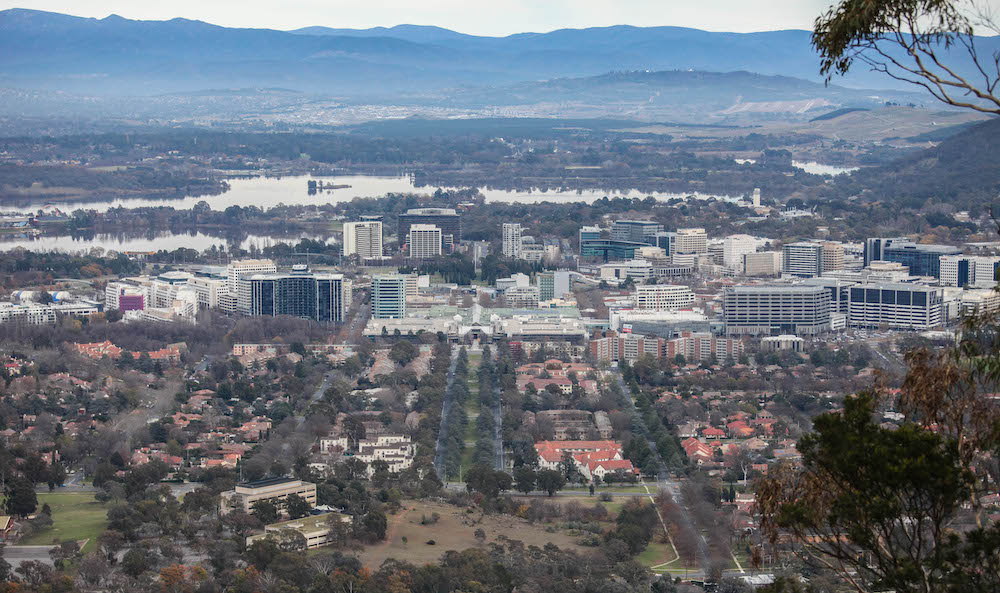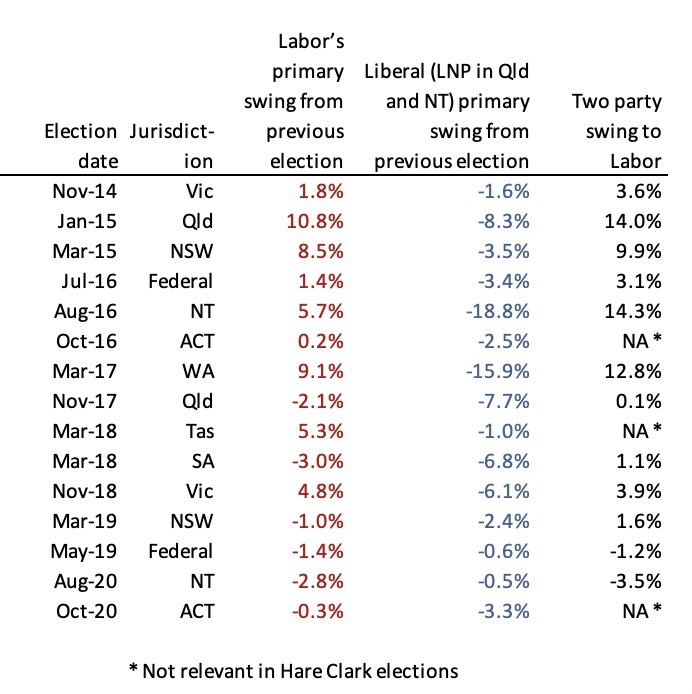The ACT election on Saturday was the 15th consecutive Australian election in which the Liberal Party has lost ground. Why has it swung so far to the right, away from its own principles?

The usual story about the ACT election is that because the ACT is a Labor stronghold Labor was bound to be returned to office. The ACT has hardly any rural population outside Canberra and its employment base is heavily represented by public servants and academics – all the conditions that make for a left-leaning electorate. Most people saw a re-elected Labor-Green government inevitable.
That’s only part of the story, however, because Labor did not do particularly well. At this stage, with 81 per cent of the vote counted, there has actually been a small (0.3 percent) swing against Labor. The big swing is a 3.4 per cent gain in the Green vote, accompanied by a 3.3 per cent fall in the Liberal vote.
The Liberals went into the election with little expectation of winning office, but they did expect to dent the government’s support. Labor or Labor-Green governments have been in power for 19 years, and are looking tired; a promised expansion of the overcrowded Canberra Hospital has been on hold; and many people believe that the Barr Government is too close to property developers – accusations of cosiness rather than corruption. And, as Canberra grows and ages, it is starting to look like any other Australian capital city: relatively fewer public servants and academics, relatively more tradespeople and small business people, and relatively more older people. By this logic, the ACT should be reverting towards the national mean.
But these trends did not help the Liberals, who went into the election with what might be called a small scale of Morrison’s economic policy. Their platform was about putting money into people’s pockets with promises to freeze rates (Canberra rates are already high), to reduce car registration fees and to give some minor handouts – a fistful of dollars. There was little about improving government services or investing in infrastructure.
It failed to sell.
Deficits are OK – essential in the current situation. But we must have something to show for them; otherwise they simply fund current consumption at the expense of future liabilities. That was the flaw in the ACT Liberals’ policy and is one of the big flaws in the federal Coalition’s policy.
Why did the Greens do so well?
The Greens did well, not only in their primary vote, but also in terms of seats, in the ACT’s 25-member Assembly, elected on a Hare-Clark system with five electorates of five members each. They will have at least four members – possibly 5 or even 6 – more than enough to hold the balance of power.
Their success was unexpected: on election night some of the successful Green candidates looked gobsmacked, as if Antony Green’s computer program had some terrible flaw. After all the Barr Government has a reasonably good environmental record, including a 100 per cent renewable electricity supply and a phase-out of gas. In comparison with NSW Labor, ACT Labor has a strong commitment to dealing with climate change. There was no strong environmental reason to vote against Labor.
There is no obvious explanation for the Greens’ success, but some credit must be due to the fact that the ACT Greens have a track record in shaping realistic and implementable government policies – until 2016 in cross-bench agreements, and in 2016-2020 with their leader holding several portfolios in government. They conform more to the style of green parties in mainland Europe than to the stereotype of tree-huggers and environmental warriors portrayed by their political opponents. And unlike the Federal Greens they have engaged in practical politics, rather than at times standing petulantly on purist principles, wrecking the Labor Party’s attempts to deal with difficult problems.
Back to the Liberals
This is now the 15th Australian election since 2014 in which the Liberals have lost ground in their primary vote. The party swings are shown in the table below – see the blue column.
Some may query results such as the 2018 South Australian election, when the Liberals won office while losing the vote, but this was partly because there was another centre-right party (SA Best) in the contest, and a distribution bias that had unfairly benefited Labor was rectified.
The Liberals’ general success in gaining and holding office lies not in their primary vote, but in their alliances with parties further on the right – with the National Party in formal coalition, and with parties such as One Nation and Clive Palmer’s UAP in preference deals.
Which brings us back to the ACT, where mathematically the Liberals could still conceivably form government. Neither Labor nor Liberals can form a majority government; the Greens have to be brought in through a crossbench or coalition agreement.
We take it for granted that there won’t be a Liberal-Green government, however, and indeed the Greens rejected such a deal before the election. But why is such a deal beyond our imagination? Austria, for example, is governed by a coalition between the centre-right People’s Party and the Greens.
We complain about political polarisation – “toxic partisanship” – and its corrosive effect on our public life. Much responsibility for this dismal situation has to be sheeted home to the Liberal Party. As it has been losing ground in its primary vote its dependence on parties further on the right has dragged it in that direction. The way the National Party was able to dictate the Liberal Party’s energy policy, and to see the Liberal Party throw out Turnbull, is a strong case in point.
It doesn’t have to be this way.
Ian McAuley is a retired lecturer in public finance at the University of Canberra. He can be contacted at “ian” at the domain “ianmcauley.com” .


Comments
9 responses to “The ACT Election – a loss for Liberals but not really a win for Labor”
I generally agree with previous comments on the result of the ACT Election last weekend .As a Canberra resident since 1983 I can remember the period prior to self government and the idiotic groups who ran for the first Assembly Election with the intention of dismantling it if they won (fat chance they had!). The Canberra Liberals promises were wildly out of touch and for the educated citizens of Canberra simplistic and unrealistic. Neo-liberal ideas are seen by Canberreans watching the antics on the “Hill” as anti worker and pro business. Having experienced the “Summer to Hell” in recent memory a lot of voters went Green as a result of a real wake up call about Climate Change. One hopes (forlornly) that the “Feds” will get the message that the average educated Aussie is worried about the future world for our kids and grand kids. I know I am!
It’s quite simply explained.
A lot of Canberrans see Labor and Greens as very close, and they have proven effective at at working together, particularly during the last term in office when the territory has faced a number of issues such as fire and Coronavirus. You don’t see the political games being played between Greens and Labor that you might see in other states and at the federal level. Andrew Barr and Shane Rattenbury appear to get on very well and they hold a lot of views in common. They are not that different.
It’s a very progressive city and many people are convinced about the need to act on climate change and care for our environment which is under threat from the federal and state Liberals and Nationals. It’s a highly educated city and territory, and there is no local Murdoch newspaper of disinformation. Facts matter in Canberra, and that is why Allister Coe’s magic wand approach with unproven economic claims, silly gimmicks, and attempts to look greener than the Greens and more caring than Labor, did not work. The Liberal campaign reeked of shallowness, fake claims, and taking Canberrans for fools.
Given that the Greens had already said they would not form a government with the Liberals, many people saw this as an opportunity to push the limits further by voting Green to make the resultant ACT Legislative assembly even more progressive, and create an even stronger environmentally responsible future.
A large enough cohort of people in Canberra see their voting choice as:
Greens first.
Labor second.
Liberals never.
That’s how they rate. It’ s not the largest cohort but it is a very powerful one these days. In my view it was the shift to Greens that took from Labor and Liberals, but it was pretty obvious before the election that a potential government of Labor and the Greens would be formed again, and that it would be the best option for the ACT for the future for the progressive side of politics. They have proven they can work together before, and the power of the Liberals would be weakened even further. Unfortunately the Liberals in the ACT due to Zed Seselja’s previous influence, has shifted the party further to the conservative (religious) right like the federal Liberals.
Despite the ACT Liberals campaign failure, it must also be said the the Federal Liberal government has not done them good service. Federal Liberals stick their noses far too much into Canberran affairs and politics, they are seen as chokingly conservative, and nasty game players par excellence with anything the ACT government tries to do simply because it is progressive and Labor. The ACT has paid a price being a Labor stronghold and there has been a war going on here against the public service since Abbott was elected. The ACT has also been prejudiced against by the federal Liberals in terms of fair and proportional funding, and the territory always misses out on the Liberal Party’s pork-barrel gifts. Barnaby Joyce’s efforts to move the public service elsewhere has also taken its toll, and public servants feel more draconian pressure from a federal government, one that has highly politicized the public service from top down.
Thanks – that’s far better and more-nuanced analysis. (Declaration: I’ve lived in Canberra since early 1972).
Thanks Peter. I first came to the ACT in the same year as you did. Apart about 5 years working overseas I’m still here too. Although I sometimes find the weather a little extreme these days on occasion, it is a great place to live for social and many other reasons – yet it’s often unnoticed in what it achieves, perhaps deliberately. I’m very pleased that we have 100% renewable energy generation and intelligent co-operative people governing us with genuinely decent intent to create a better and sustainable future. A “better normal” as Shane Rattenbury put it on Saturday night.
Coalitions between Greens and right of center conservatives are quite common in Europe. I think in Europe the Greens are far more pragmatic than the Australian Greens (something already mentioned in other comments).
However, another reason why Greens and mainstream parties don’t form coalitions here is the mainstream parties are so ideologically focussed that any possibility of compromise and agreement is rejected, often with most fancy of reasons. And this has infected all three mainstream parties: LNP, ALP and NP. The reason is the-winner-takes-it-all mentality. Every government here is elected on about 50% of the votes (meaning nearly 50% voted against) but it invariably acts as if it has an unfettered mandate to change whatever it proposed during the election.
This shows the rigidity in Australian politician’s thinking.
The other reason is of course the overwhelming influence of the (extreme) right wing Murdoch press which is poisoning any discourse about policy issues. Kevin Rudd has something to say about this.
And finally I have to say regrettably that the ethical and moral attitudes of our politicians (very many, but of course not all) in Australia leaves very much to be desired.
The ACT Greens taking a pragmatic approach and working WITH Labor not against them. Reward – a place at the table governing the ACT.
Take note Queensland Greens.
Take note Federal Greens.
Australia is being left behind. Unfortunately, for most people in Australia, forward thinking stopped at the year 2000. We are now twenty years into the new millennium, yet today is still like living in the 1990’s.
Why is it that people are so anxious and insular, that they do not want to grasp at new opportunities? Why is it that they seem satisfied with stagnant wages, high debts, mental illness and resistance to change?
I think Australians have been beaten into submission and kept in ignorance by a combination of right wing conservative politics that promotes fear over hope, aided and abetted by a media monopoly that screams bloody murder if anybody is game enough to say the words “climate change”.
Australians will continue to fear anything to do with a “green new deal”, whilst the “brown old deal” is seen as a comfortable existence by our politicians and mainstream media. Woe betide us if we decide to change and move forward.
There would appear to be two other factors in play.
(1) Australian voters seem to resist electing and aligning federal and state/territory governments of the same party persuasion(s). It does happen, but is rare enough to draw comment. Consequently, with an LNP federal government in power in Canberra, Canberra residents may have been wary of electing an ACT Liberal Government.
(2) there are many residents of Canberra well aware of the intricacies of government financing and costing programs. The promise by ACT Liberals of lowering local taxes while increasing services would have been regarded as impossible.
Now – speculate on why those same electors increased the Greens’ vote. Is this indicative of a small shift in voters’ perceptions about Australia’s future ?
Greens vote due to Libs not being able to make themselves vote Labor?
Faint praise. What’s being forgotten here, is that for all their faults, Barr and Rattenbury are still a capable and pragmatic team who can work together and hold a personable policy conversation with voters. If only one could say the same of their lame and uninspiring federal counterparts, Albanese and Bandt.